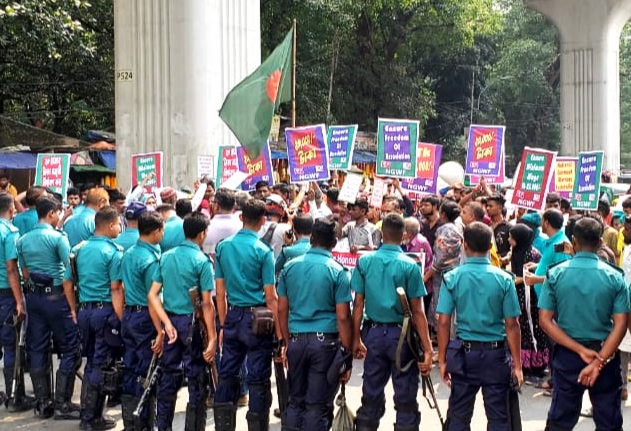
Bangladesh Minimum Wage talks on the brink of failure? Employers table an outrageous monthly wage offer of $95 as brands remain silent
Concerns are rising that the ongoing wage talks for the Bangladesh ready-made garment sector could result in a new poverty wage of just 95 USD per month (10,400 Tk), based on an outrageous proposal presented by employers at the latest Wage Board meeting. Trade unions and labour organisations reject this barefaced attempt to keep workers trapped in poverty. The deficient offer results from the reluctance of major fashion brands to actively support workers in their struggle for decent wages.
Living-wage-committed brands such as Asos, H&M, M&S and Uniqlo must end their silent complicity with cutthroat business owners, pay higher prices for their products and support Bangladeshi trade unions’ demand to raise the wage to at least 207 USD (23,000 Tk) per month.
Various credible Bangladesh media sources report that the employer side tabled an offer of just 95 USD (10,400 Tk) at the latest minimum wage board meeting on the 22 October 2023. This fuels concerns that the new minimum wage might fall drastically short of what cost-of-living research points towards as the bare minimum required for a dignified life in Bangladesh.
“If the new minimum wage is as low as 10,400 Tk, this means that the majority of workers cannot survive on an income they earn for a 48+ hour work week in this industry. They will continue to be dependent on other ways to make ends meet: working long hours of overtime, skipping meals or compromising on other basic needs of themselves or their dependents,” says Kalpona Akter, president of the Bangladesh Garment and Industrial Workers Federation. “International buyers should take responsibility now before the situation gets even worse.”.
Trade unions have staged several demonstrations in Bangladesh and have reached out to over 60 major brands sourcing from Bangladesh. Brands were urged to support the demand for 23,000 Tk, commit to sourcing from Bangladesh after the minimum wage increase, and absorb the higher cost of labour in their purchasing prices.
“We call on brands to speak out in support of our demands because brands hold significant power to make buying decisions that have a direct impact on workers’ wages. We know that decisions on wage increases are strongly linked with the prices buyers are willing to pay,” says Amirul Haque Amin, president of the National Garment Workers Federation.
This was underlined by the Bangladesh Garment Manufacturers and Employers Association’s (BGMEA) recent call on brands that committed to better wage practices through the Action Collaboration Transformation (ACT) programme urging them to consider the higher cost of living and inflation that workers are facing by paying a “fair price” and be more “empathetic and rational on pricing and sourcing practices”.
A few brands have acted upon the call from trade unions and published individual statements in support of their wage demands. However, several major buyers are failing to do so, including brands with strong living wage commitments in their codes of conduct. Asos, H&M, M&S, Primark, Zalando, Uniqlo, New Look, Next, Bestseller, Esprit, and Aldi are among the brands that have remained painfully silent.
“Brands’ failure to commit to increasing their purchasing prices in line with a wage increase to 23,000 Tk could result in the adoption of the outrageously low employers’ wage proposal of just 95 USD per month. The silence of buyers encourages employers to continue violating the human right to a living wage that ensures workers and their families a life with dignity. Living wage commitments by brands that refuse to listen to trade unions’ desperate call for support clearly cannot be taken seriously”, said Anne Bienias, Living Wage Coordinator at Clean Clothes Campaign.
Background
It has been six months since the Bangladeshi government formed a Wage Board to recommend a new minimum wage for workers in the country’s multi-billion dollar garment export industry and the deadline is approaching soon. Pressure to form a Wage Board came from garment unions in the country which demanded the minimum wage increase as their workers struggle to make ends meet due to inflation. The wages were last reviewed in 2018.
Unions have been calling for a wage increase from 8,000 Tk ($73) to 23,000 Tk ($207) per month based on a thorough cost of living study conducted by the Bangladesh Institute for Labour Studies. The report sets out why any wage below 23,000 Tk will not be enough to enable workers to support themselves and their dependents.